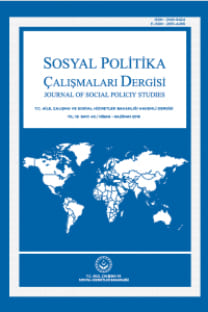YEREL DİNAMİKLERE DAYALI BİR SOSYAL İÇERME PROGRAMI: TÜRKİYE’NİN SOSYAL DESTEK PROGRAMI ÖRNEĞİ
Gelişmiş ülkelerde zaman içerisinde yoksulluk programları sosyal dışlanma programlarına evrilmiş ve geniş şekilde tartışılmıştır. Batının sosyal politika çerçevesine paralel olarak, Türkiye sosyal politikalarını güçlendirmeye başlamıştır. 2008 yılında Kalkınma Bakanlığı Sosyal Destek Programı(SODES) adıyla yeni bir sosyal hibe programı başlatmıştır. Bu makale; bu programın kurulmasına yol açan sosyal şartları, programın hazırlık sürecini, proje döngüsünü ve programın temel çıktılarını analiz etmektedir. Çalışma, mevcut ve potansiyel sosyal hibe programları için tavsiyelerle sonuçlanmaktadır.
Anahtar Kelimeler:
Sosyal Politika, Sosyal Dışlanma, Sosyal Kalkınma, Sosyal Fon, Türkiye
A SOCIAL INCLUSION PROGRAM BASED ON LOCAL DYNAMICS: THE CASE OF SOCIAL SUPPORT PROGRAM OF TURKEY
Poverty programs in advanced industrial countries have transformed into social exclusion programs, and the concept of social exclusion began to be extensively debated. Parallel to the social policy framework of West, Turkey has also begun to strengthen social policies. In 2008, Turkey’s Ministry of Development launched a new social grant program known as the Social Support System (SODES). his article analyses the societal conditions that cause establishment of the program, the preparation process and project cycle of the initiative, and basic outcomes of the program. The study concludes with policy recommendations for current and possible social fund programs.
Keywords:
Social Policy, Social Exclusion, Social Development, Social Fund, Turkey,
___
- Bowring, F. (2000). Social exclusion: Limits of the debate. Critical Social Policy, 20(3), pp. 7-30.
- Bradshaw, J. (2001, March). Methodologies to measure poverty: More than one is best! In International Symposium Poverty: Concepts and Methodologies. Symposium
- conducted at the meeting in Mexico City, Mexico.
- Buğra, A and Keyder, Ç. (2005). Poverty and social policy in contemporary Turkey.
- Boğaziçi University Social Policy Forum.
- Burchardt, T., Le Grand, J. and Piachaud, D. (1999). Social exclusion in Britain 1991-1995.
- Social Policy & Administration, 33(3), pp. 227-244.
- Davies, J S. (2005). he social exclusion debate: Strategies, controversies and dilemmas.
- Policy Studies, 26(1), pp. 3-27.
- Faguet, J. P. and Wietzke, F. B. (2006). Social funds and decentralisation: Optimal
- institutional design. Public Administration and Development, 26(4). pp. 303-315.
- Sujatmiko, G. I. (2011). Social exclusion and inclusion policy in Indonesia. International
- Journal of Business and Social Science, 2(23) (Special Issue), pp. 186-192.
- Giddens, A. (1998). he third way. Cambridge: Polity Press.
- Haan, A. (2000). Social exclusion: Enriching the understanding of deprivation. Studies in
- Social and Political hought, 2(2), pp. 22-40.
- Kalkınma Bakanlığı (2003). 2003 yılı programı. Retrieved from http://ekutup.dpt.gov.tr/
- program/2003.pdf, on 24.03.2015.
- Kalkınma Bakanlığı (2007). 2007 yılı programı. Retrieved from http://ekutup.dpt.gov.tr/
- program/2007.pdf, on 24.03.2015.
- Kalkınma Bakanlığı (2013a).Sosyal destek programının değerlendirilmesi. Retrieved from
- http://www3.kalkinma.gov.tr/sodes/SODES’in_Degerlendirilmesi_Arastirmasi_
- Raporu.pdf, on 12.03.2015.
- Kalkınma Bakanlığı (2013b). 2013 yılı programı. Retrieved from http://www.dpt.gov.tr/
- DocObjects/View/14764/2013_Yili_Yatirim_Programi.pdf, on 24.03.2015.
- Klanfer, J. (1965). L’Exclusionsociale: Etude de la marginalitédans les sociétésoccidentales.
- Paris: Bureau de Recherchessociales.
- Levitas, R. (1998). he inclusive society? Social exclusion and new labour. Basingtoke:
- Palgravae Macmillan.
- Penna, S. and Brien, S. (2008). Social exclusion in Europe: Some conceptual issues.
- International Journal of Social Welfare, 17(1), pp. 84-92.
- Putnam, R. (1995). Bowling alone: America’s declining social capital. Journal of Democracy,
- (1) pp. 65–78.
- Putnam, R. (1993). he prosperous community: Social capital and economic growth. he
- American Prospect, 13, pp. 35-42.
- Room, G. J. (1999). Social exclusion, solidarity and the challenge of globalization.
- International Journal of Social Welfare, 8, pp. 66-174.
- Room, G. J. (1995). Beyond the threshold: he measurement and analysis of social exclusion.
- Bristol: Policy Press.
- Sen, A. (1999). Development as freedom. Oxford: Oxford University Press.
- Sen, A. (1987). Commodities and capabilities. New Delhi: Oxford University Press.
- Türkiye İstatistik Kurumu (2012a).Gelir ve yaşam koşulları araştırması haber bülteni.
- Retrieved from http://www.tuik.gov.tr/PreHaberBultenleri.do?id=10902, on
- 02.2015.
- Türkiye İstatistik Kurumu (2012b). Hanehalkı ve tüketim harcaması araştırması haber
- bülteni.
- Retrieved from http://www.tuik.gov.tr/PreHaberBultenleri.do?id=10875 on 25.02.2015.
- Türkiye İstatistik Kurumu (2012c). Yoksulluk çalışması haber bülteni. Retrieved from
- http://www.tuik.gov.tr/PreHaberBultenleri.do?id=10952, on 22.02.2015.
- Türkiye İstatistik Kurumu (2012d). Hanehalkı işgücü istatistikleri haber bülteni. Retrieved
- from http://www.tuik.gov.tr/PreHaberBultenleri.do?id=13439, on 22.02.2015.
- Türkiye İstatistik Kurumu (2012e). Gençlerin işgücü piyasasına geçişi araştırma sonuçları
- haber bülteni. Retrieved from http://www.tuik.gov.tr/PreHaberBultenleri.do?id=8373,
- on 17.02.2015.
- Türkiye İstatistik Kurumu (2012f). Doğum istatistikleri haber bülteni. Retrieved from
- http://www.tuik.gov.tr/PreHaberBultenleri.do?id=10923, on 15.02.2015.
- Van Domelen, J. (2002). Social funds: Evidence on targeting, impacts and sustainability.
- Journal of International Development, 14(5), pp. 627-42.
- World Bank (2000). Proceedings of the second international conference on social funds
- (SICSF): Evolving in the new millennium. World Bank, Washington, D.C.
- ISSN: 2148-9424
- Yayın Aralığı: Yılda 4 Sayı
- Başlangıç: 2012
- Yayıncı: Aile,Çalışma ve Sosyal Hizmetler Bakanlığı
Sayıdaki Diğer Makaleler
YEREL DİNAMİKLERE DAYALI BİR SOSYAL İÇERME PROGRAMI: TÜRKİYE’NİN SOSYAL DESTEK PROGRAMI ÖRNEĞİ
SÜRDÜRÜLEBİLİRLİK TEMELİNDE YOKSULLUK KAVRAMININ YENİDEN YORUMLANMASI: YOKSULLUK DÜĞÜMÜ
SOSYAL EKONOMİ POLİTİKALARI KAPSAMINDA SOSYAL BELEDİYECİLİK ANLAYIŞI
SOSYAL HİZMET UYGULAMALARINDA EMPATİNİN ÖNEMİ VE YARDIM İLİŞKİSİ ÜZERİNDEKİ ETKİSİ
YETİŞTİRME YURTLARINDA KALAN VE ORTAÖĞRETİME DEVAM EDEN ÖĞRENCİLERİN SELF-DETERMİNASYON DAVRANIŞLARI
Dilek TÜRKMEN ARSLAN, Emine ÖZMETE
GELENEKSEL TÜRK AİLESİNDE ÇOCUK VE ÇOCUKLA İLGİLİ İNANÇ FELSEFESİ: KIRGIZİSTAN ÖRNEĞİ
